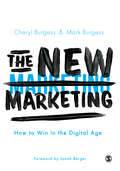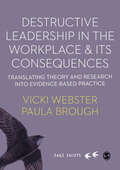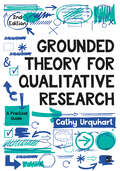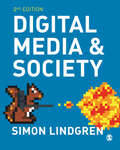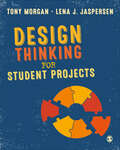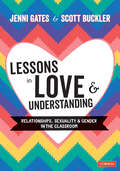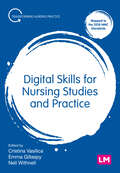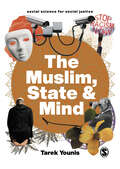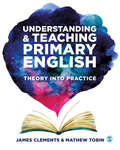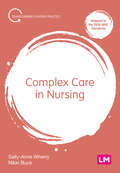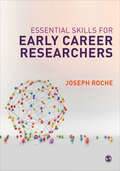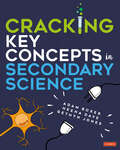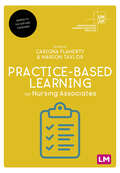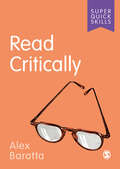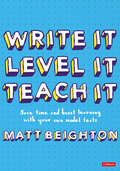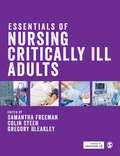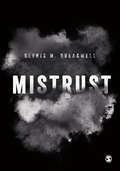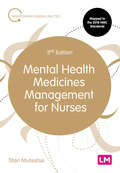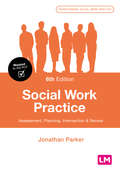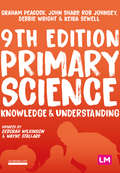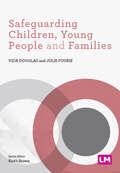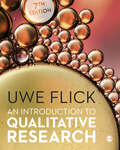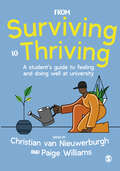- Table View
- List View
The New Marketing: How to Win in the Digital Age
by Mark Burgess Cheryl BurgessIn our hyper-connected world that is changing at warp speed, marketers recognize the need to shift from traditional marketing methods to a new way that can help them better navigate the unpredictable environment. For traditionalists, this change has posed a challenge. Many have tried to incorporate new approaches into the old models they grew up with, only to be frustrated with the results. From the bestselling authors of The Social Employee, and LinkedIn Learning course authors, comes a powerful new textbook that cracks the marketing code in our hyper-focused digital age. The New Marketing, with contributions spanning CMO trailblazers to martech disruptors, behavioral economics luminaries at Yale to leading marketing thinkers at Kellogg and Wharton, is a GPS for navigating in a digital world and moves the craft of marketing through the forces of marketing transformation. We can’t predict the future. But our goal is to help make Masters/MBA students and marketing practitioners future-ready and successful.
Using Focus Groups: Theory, Methodology, Practice
by Silvia Cataldi Ivana AcocellaDrawing on the authors′ thirty years of combined experience in the field, this authoritative, step-by-step guide to conducting focus groups features dedicated chapters on all aspects of the research process. Loaded with real world research examples from across the social sciences, and learning features such as ′expert advice′ and ′concepts and theories′ boxes, as well as end of chapter exercises and further reading, this is the perfect manual for novice researchers who want to conduct a successful focus group.
Destructive Leadership in the Workplace and its Consequences: Translating theory and research into evidence-based practice (SAGE Swifts)
by Paula brough Vicki WebsterWith relevance across public, private and not-for-profit sectors, and combining perspectives from both the business and psychology worlds, this book is a cross-disciplinary look at how destructive leaders can impact organisations and their workers, and how best to recognise and deal with them. This text bridges the gap between the theory and the practical application, by taking the academic research and translating this for students, managers and practitioners in the field into practicable interventions they can use in their everyday practice to recognise and resolve issues raised by destructive leaders. Using case studies throughout, this guide takes the theory and places it in the real world, helping readers take the theory beyond the page and apply it to their practice.
Grounded Theory for Qualitative Research: A Practical Guide
by Cathy UrquhartStraightforward and accessible, this pragmatic guide takes you step-by-step through doing grounded theory research. With hands-on advice focussed around designing real projects, it demonstrates best practice for integrating theory building and methods. Its extensive examples and case studies are drawn from across the social sciences, presenting students with a range of options for both applying and using grounded theory. Clear and easy to follow, this second edition: Traces the evolution of grounded theory method and provides a clear introduction to the nuanced history of grounded theory Showcases important concepts like theory building, helping you to reflect on the wider context of your research and the contribution it makes to existing literature Offers practical advice for how to do grounded theory research, alleviating common student concerns every step of the way This new edition features two new chapters: one covering theory, and one on Theoretical Sampling. Several chapters have also undergone updates: Chapter 5 includes a wider range of perspectives including feminist and post-colonial perspectives, Chapter 9 features new, contemporary examples on how to write up your study, and Chapters 2 and 10 include new developments in the field of Grounded Theory. Supported by videos from the author sharing expert advice, this book helps you build the confidence to explore and successfully complete your own grounded theory research.
Digital Media and Society
by Simon LindgrenWhat does it mean to live in a digital society? Does social media empower political activism? How do we form and express our identity in a digital age? Do algorithms and search engine results have a social role? How have software and hardware transformed how we interact with each other? In the early 21st century, digital media and the social have become irreversibly intertwined. In this cutting-edge introduction, Simon Lindgren explores what it means to live in a digital society. With succinct explanations of the key concepts, debates and theories you need to know, this is a must-have resource for students exploring digital media, social media, media and society, data and society, and the internet. “An engaging story of the meaning digital media have in societies. The writing is relatable, with diverse and comprehensive references to theories. Above all, this is a fun book on what a contemporary digital society looks like!” - Professor Zizi Papacharissi, University of Illinois at Chicago Simon Lindgren is Professor of Sociology at Umeå University in Sweden. He is also the director of DIGSUM, an interdisciplinary academic research centre studying the social dimensions of digital technology.
Design Thinking for Student Projects
by Tony Morgan Lena J. JaspersenEmployers look for more than just a good degree. Candidates are expected to be able to creatively solve problems, manage change, demonstrate commercial awareness, and collaborate and communicate at different levels. Increasingly, universities are helping their students gain these skills through team-based projects, utilising innovation to solve real-world problems. Created with direct input from students and packed with advice and guidance from leading industry experts, this textbook walks readers through the steps necessary to deliver a team-based project, facilitating the development of key employability skills along the way. Readers can also connect with each other and create their own projects and teams via the book’s LinkedIn group. Suitable for undergraduates and postgraduates across all disciplines undertaking team-based modules and courses, as well as those studying independently, Design Thinking for Student Projects is the essential guide to learning practical Design Thinking and employability skills. Tony Morgan is an Associate Professor in Innovation Management Practice at the University of Leeds. Lena J. Jaspersen is a University Academic Fellow in Innovation Management at the University of Leeds.
Lessons in Love and Understanding: Relationships, Sexuality and Gender in the Classroom (Corwin Ltd)
by Scott Buckler Jenni GatesSex and gender are delicate and nuanced issues for all of us and can be intimidating topics to teach. This practical, empathetic book aims to dispel some of the uncertainties that many teachers have and empower them to lead inclusive, age-appropriate lessons in primary and secondary schools. Taking an approach that celebrates the individual identity of all learners, and underpinned by an awareness of the complexity of language around these topics, this book offers a careful evaluation of the 2020 Relationship and Sex Education policy for schools in England, and how schools can offer intelligent, socially responsible, sex education that goes beyond simply meeting statutory requirements.
Digital Skills for Nursing Studies and Practice (Transforming Nursing Practice Series)
by Neil Withnell Cristina M. Vasilica Emma GillaspyThis practical book equips you with the digital capabilities you need for your nursing studies and career. Whether you are a digital native or less confident with technology, the book develops your ability to harness digital tools and opportunities to enhance your nursing practice. From using technology for better communication, collaboration and participation to honing your technical skills, the book instils the digital mindset you need as a 21st century nurse. Key features: · Mapped to HEE’s Digital Capability Framework · Structured around opportunities for self-assessment and reflection to help you identify the areas that require work · Focuses on the capabilities specifically needed for the nursing role, using activities and case studies to highlight their application to practice · Covers topical issues such as digital wellbeing, online professionalism, data protection and more
The Muslim, State and Mind: Psychology in Times of Islamophobia (Social Science for Social Justice)
by Tarek YounisMental health is positioned as the cure-all for society’s discontents, from pandemics to terrorism. But psychology and psychiatry are not apolitical, and neither are Muslims. This book unpacks where the politics of the psy-disciplines and the politics of Muslims overlaps, demonstrating how psychological theories and practices serve State interests and perpetuate inequality—especially racism and Islamophobia. Viewing the psy-disciplines from the margins, this book illustrates how these necessarily serve the State in the production of loyal, low-risk and productive citizens, offering a modern discussion of three paradigms underlying the psy-disciplines: neoliberalism, security and the politics of mental health. Tarek Younis is Senior Lecturer in Psychology at Middlesex University.
Understanding and Teaching Primary English: Theory Into Practice
by James Clements Mathew TobinInspiring and supporting you to become an insightful, creative and professional teacher of primary English. Teaching children English is an opportunity to give them skills that will enrich their entire lives and is a crucial part of their intellectual development. Covering all major aspects of primary English and following the foundations set in the early years, this book takes you through your teacher training and into your early career in the classroom. Each topic explores what we know from theory and the latest research, and then demonstrates how you can use this understanding in practice. Drawing on the authors’ own knowledge and experiences in the classroom, the book is full of practical advice and strategies to support your own teaching, while also helping you develop your subject knowledge. Key topics include: · Reading and writing in the early years · Curriculum design and planning · Promotive reading for pleasure and teachers as readers · Teaching writing and its role as a form of communication · Vocabulary development and word knowledge · Assessment for formative and summative purposes · Oracy and spoken language development
Complex Care in Nursing (Transforming Nursing Practice Series)
by Sally-Anne Wherry Nikki BuckWorking with people living with complex health needs is an everyday part of the nursing role. It requires an understanding of different conditions and comorbidities, of the societal and political factors that influence them and of the health and social care services available to manage them. This book joins the dots between the biological, social, and psychological drivers that add complexity to care. From knowledge of key concepts like polypharmacy and the social and political determinants of health, to practical skills in assessment and shared decision making, this book will provide you with a holistic understanding of complex care. Key features - Mapped to the 2018 NMC Standards of Proficiency - Includes reflections and insights from experts of their own practice - Case studies explore what complexity means in action, encouraging you to reflect and draw on your own experiences - Covers all four fields of nursing in primary and secondary settings, as well as the voluntary sector
Essential Skills for Early Career Researchers
by Joseph RocheThe perfect companion to support your development of the academic and professional skills you need as an early career researcher to help you thrive in academia. This practical book offers guidance on the essential skills you need to succeed as an academic researcher. · Work out how to thrive in academia while protecting your own wellbeing · Learn how to develop discipline and structure in your academic writing · Navigate the nuances of research funding applications · Understand how to build professional development into your daily work · Take a smart perspective on career progression Designed to work across academic disciplines, each chapter includes lessons learned from published literature as well as perspectives from recent early career researchers to provide you with detailed insight applicable to diverse academic contexts. This book is accompanied by 30+ online resources and sample templates, including downloadable and editable research proposals, publication plans, lecture slides, resumes and cover letters. Joseph Roche is a researcher and lecturer at Trinity College Dublin.
Cracking Key Concepts in Secondary Science (Corwin Ltd)
by Adam Boxer Heena Dave Gethyn JonesThe perfect companion to help you crack some of secondary science’s most challenging concepts in your teaching. Secondary science teaching is a heroic task, taking some of humanity’s greatest discoveries and explaining them to the next generation of students. Cracking some of the trickiest concepts in biology, chemistry and physics, with walkthrough explanations and examples inspired by direct instruction, this book will bring a fresh perspective to your teaching. · 30 key concepts explored in depth · Understand what students should know before and after the lesson · Tips and tricks offer detailed advice on each topic · Checks for understanding so you can test your students’ knowledge Adam Boxer is Head of Science at The Totteridge Academy in North London. Heena Dave was Head of Science at Bedford Free School. Gethyn Jones is a teacher of physics at an independent school in London
The Muslim, State and Mind: Psychology in Times of Islamophobia (Social Science for Social Justice)
by Tarek YounisMental health is positioned as the cure-all for society’s discontents, from pandemics to terrorism. But psychology and psychiatry are not apolitical, and neither are Muslims. This book unpacks where the politics of the psy-disciplines and the politics of Muslims overlaps, demonstrating how psychological theories and practices serve State interests and perpetuate inequality—especially racism and Islamophobia. Viewing the psy-disciplines from the margins, this book illustrates how these necessarily serve the State in the production of loyal, low-risk and productive citizens, offering a modern discussion of three paradigms underlying the psy-disciplines: neoliberalism, security and the politics of mental health. Tarek Younis is Senior Lecturer in Psychology at Middlesex University.
Practice-Based Learning for Nursing Associates (Understanding Nursing Associate Practice)
by Marion Taylor Cariona FlahertyThis book will help you to prepare for and excel in your nursing associate practice placements. Covering all settings and all fields of nursing, the book will show you how to make the most of each placement and transfer learning and skills from one area of practice to another. Key features: - Fully mapped to the NMC Standards of Proficiency for Nursing Associates (2018) - Helps you prepare for placements in a way that best supports your professional development and personal wellbeing - Case studies and activities introduce you to different settings across all fields of nursing - Focussed specifically on the requirements of the nursing associate role, helping you to develop into a confident professional practitioner THE SERIES: The Understanding Nursing Associate Practice series (UNAP) is a new collection of books uniquely designed to support trainee nursing associates throughout their training and into a professional career.
Read Critically (Super Quick Skills)
by Alex BarattaCritical reading is the foundation of good research. Read Critically gives you the knowledge and tools you need to be able to extract meaning from texts and judge its quality, relevance and significance. Understand your assignment question Know how to think critically, and in turn read critically Write critically and ace your assignment. Super Quick Skills provides the essential building blocks you need to succeed at university - fast. Packed with practical, positive advice on core academic and life skills, you’ll discover focused tips and strategies to use straight away. Whether it’s writing great essays, understanding referencing or managing your wellbeing, find out how to build good habits and progress your skills throughout your studies. Learn core skills quickly Apply them right away and see results Succeed in your studies and in life Super Quick Skills gives you the foundations you need to confidently navigate the ups and downs of university life.
Write It Level It Teach It: Save time and boost learning with your own model texts
by Matt BeightonStop spending hours searching for, adapting and improving model texts for use in your classroom teaching. There is a way to save time and get properly levelled and relevant texts for your teaching – write your own. In Write It. Level It. Teach It., Matt Beighton shows you how and why writing your own model texts for teaching is so much better. Based on his experiences as a classroom teacher and having written nearly 1,000 comprehension texts for the Literacy Shed, Matt demonstrates how to do this quickly and effectively. * Includes writing templates for busy teachers. * Explores why correctly levelled texts matter. * Boosts learning and engagement. * Saves time and effort through collecting and re-using texts.
Essentials of Nursing Critically Ill Adults
by Samantha Freeman Colin Steen Gregory BleakleyAn essential guide to critical care nursing that includes all the key scientific knowledge and procedures you will need to know when entering the critical care environment. Written by a dedicated team of lecturers and practitioners with extensive experience in critical care nursing, this textbook covers all the key elements involved in nursing critically ill adults, with individual chapters on managing problems associated with different organ systems and the pathophysiology behind these disorders. It also features coverage of psychological care and infection prevention, and includes a consistent focus on the importance of a person centred, evidence-based approach to critical care delivery. To further support your learning, the book is full of activities that enhance your knowledge and test your understanding, including clinical case studies, critical thinking tasks, and reflective practice exercises. For lecturers and instructors, there is a collection of online resources including a testbank of multiple-choice questions, links to relevant videos for each chapter, and PowerPoint slides for each chapter. The ideal textbook for nursing students studying critical care, undertaking clinical placements in intensive care, or nurses new to the critical care environment.
Mistrust
by Glynis M. BreakwellMistrust in the 21st century is a major societal concern. This book: - explores social psychological processes that explain why and how mistrust develops - considers the effects that it has upon those who are mistrustful and those who are mistrusted - offers a model of mistrust in individuals and communities which is based on theories of identity and social representation. With examples ranging from the the 1872 US presidential election to the Trump era, it also considers Brexit, and has a significant focus on the Covid-19 pandemic. By looking at the role of social media, and how mistrust can be weaponised this book interrogates its place in our society. Ultimately, whilst feeling mistrust is part of being human this book warns that we ignore mistrust at our peril. Dame Glynis M. Breakwell is Professor Emeritus at the University of Bath in the Department of Psychology and has Visiting Professorships at Imperial College, London, University of Surrey and Nottingham Trent University.
Mental Health Medicines Management for Nurses (Transforming Nursing Practice Series)
by Stanley MutsatsaMental Health Medicines Management for Nurses provides nursing students with guidance on how to manage medicines safely and effectively when treating patients with mental health conditions. It outlines how psychiatric drugs work, what the common treatments are, the ethical, legal, and person-centred aspects of working with psychiatric medicines, and how medicines can and should be used in mental health care. Using innovative activities and real-life case studies, this book has been carefully designed to be the ideal resource to build knowledge and confidence in this important area of practice. Key features: Updated in-line with the latest NMC standards of proficiency for registered nurses. Includes clear explanations of both the underlying biology and pharmacology as well as the wider practicalities of working with medicines. Highlights the most common mental health conditions and associated treatments, including coverage of the possible side effects for all drugs described in the book. NEW: Increased emphasis on prescribing with new content on consultation, history taking, and decision-making when prescribing. NEW: Updated sections on ethics, consent, pharmacokinetics, antipsychotics, and adverse drug reactions.
Social Work Practice: Assessment, Planning, Intervention and Review (Transforming Social Work Practice Series)
by Jonathan ParkerProviding students with a complete foundation of knowledge and understanding for each process, this step-by-step guide will introduce them to the four main aspects of social work practice, and help them to apply theory to practice across settings and service user groups.
Primary Science: Knowledge and Understanding (Achieving QTS Series)
by John Sharp Rob Johnsey Debbie Wright Keira Sewell Graham A PeacockAll the subject knowledge you need to teach primary science. If you are training to be a primary school teacher, you need to understand what you need to know about primary science before you can teach it. To help you build your subject knowledge, this comprehensive text includes subject knowledge from each part of the primary science curriculum and comes with a wide range of resources so you can test you knowledge as you progress through the course. an online science subject knowledge audit with the ability to share results end of chapter self-assessment questions Interactive tasks a science subject knowledge checklist useful weblinks for primary science teaching Recommended further reading This new edition comes with a new chapter on science in curriculum.
Safeguarding Children, Young People and Families (Post-Qualifying Social Work Practice Series)
by Vida Douglas Julie FourieKeeping children and young people safe is everybody’s responsibility. This requires health, social care and education professionals to make sense of complex family situations that are placing a child or young person at risk of harm. This is no easy feat. The actions we take matter and we need to get this right if we are to truly make things better and improve outcomes for children and young people. Using case studies, reflective questions and checklists for practice, this hands-on guide will provide you with the knowledge and skills you need to effectively and confidently make a difference to the lives of children and young people. This series of books from Learning Matters is aimed at busy social work and health care practitioners, particularly in the context of integrated health and social care, who are looking to enhance their skills and extend their knowledge. Written from a practical point of view, they have clear links to both qualifying training as well as CPD. They are up-to-date, accessible and totally skills focused.
An Introduction to Qualitative Research
by Uwe FlickContinuing to be THE guide to the whole qualitative research process for students, this book looks at both the theory behind qualitative research and how to put it into practice in your own work. For students across a range of social science disciplines and beyond, this is a must to help you enhance your research project. This edition introduces: a decolonisation of methodologies a range of indigenous, queer and feminist perspectives on methodologies assistance with defending a viva and alternative forms of assessment to suit a changing world. More additions to this seventh edition include a section on the subjectivity of a researcher, and how your identity will shape your research. The further reading has been curated to include more than just western voices, providing you with global perspectives on qualitative research. This text introduces how to sensitively undertake ethical and inclusive research with marginalised groups. This book will help you master a comprehensive understanding of qualitative research.
From Surviving to Thriving: A student’s guide to feeling and doing well at university
by Christian Van Nieuwerburgh Paige WilliamsMany universities around the world are seeing how they can use theories of positive psychology to help students cope well with the ever-increasing stresses of modern-day life and university. This practical, hands-on book will help you understand, experience and put into practice skills and strategies to improve and sustain your wellbeing so that you can thrive throughout your time at university. With enough scientific theory and knowledge for you to understand why it works, our focus is on practical activities that will make a difference in your life. Edited and authored by practising university teachers of the science of wellbeing, this textbook is essential reading for any student, whether you are studying positive psychology or just navigating university life. Each chapter explores a key area of positive psychology and provides activities to enhance your wellbeing and contribute to that of other people. Covering topics from identifying your strengths to mindfulness, and from dealing with adversity to the importance of play, this book will help you move from surviving to thriving at university. Christian van Nieuwerburgh is Professor of Coaching and Positive Psychology at the Centre for Positive Psychology and Health at the Royal College of Surgeons, Ireland, and Global Director of Growth Coaching International. Paige Williams is an Honorary Fellow of the Centre for Positive Psychology and an Associate of Melbourne Business School at the University of Melbourne.
